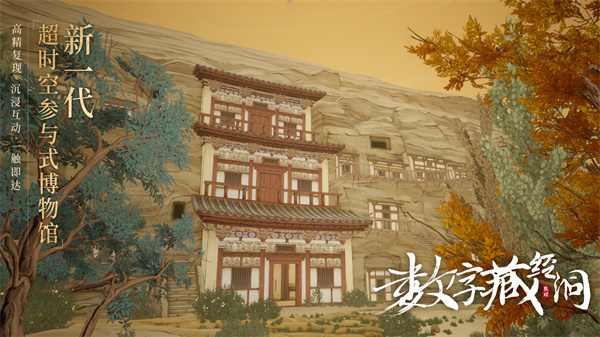
- Home
- Media Center
-
Events
- Wuzhen Summit
- Regional Forums
- Practice Cases of Jointly Building a Community with a Shared Future in Cyberspace
- World Internet Conference Awards for Pioneering Science and Technology
- The Light of Internet Expo
- Straight to Wuzhen Competition
- Global Youth Leadership Program
- WIC Distinguished Contribution Award
- Membership
- Research & Cooperation
- Digital Academy
-
Reports
- Collection of cases on Jointly Building a Community with a Shared Future in Cyberspace
- Collection of Shortlisted Achievements of World Internet Conference Awards for Pioneering Science and Technology
- Reports on Artificial Intelligence
- Reports on Cross—Border E—Commerce
- Reports on Data
- Outcomes of Think Tank Cooperation Program
- Series on Sovereignty in Cyberspace Theory and Practice
- Other Achievements
- About WIC
- 中文 | EN

Going digital for going popular -- Tech empowers traditional Chinese culture

The gamelike Digital Library Cave program enables users to virtually witness, and participate in, the rise and fall of the Library Cave, or Cave 17, at the Mogao Caves in Dunhuang, Gansu province. [Photo provided to China Daily]
BEIJING -- One year ago, a video clip featuring fanciful visuals with rich Chinese cultural elements and a beautiful aria of Peking Opera became a hit online shortly after its debut.
The promotional video of Genshin Impact, a Chinese-made open-world roleplaying game, has received over 31 million views and 2 million likes on China's video-sharing platform Bilibili. The version with English subtitles posted on the game's official YouTube channel has been viewed nearly 9 million times, gaining 360,000 likes.
Whether at home or abroad, the game has received high praise from both gamers and non-gamers alike. The opera aria, which enjoys an array of elements, has struck a chord with audiences across the world.
"Being able to see such a different style of opera has been an eye-opening experience for me, and I wish we were taught about it in music history," said Kathrynn Davis, a teenage Western opera major student from the United States, in her comment on YouTube.
The integration of traditional Chinese culture and a fresh angle to presenting the culture have served the game's success well, according to Liu Wei, CEO of the game's Shanghai-based developer miHoYo.
A supporter of Chinese culture, miHoYo designed the game's plots on the basis of traditional Chinese festivals and cultural activities, such as the Lantern Festival, Mid-Autumn Festival, chess play and Nuo dance.
"We aim to make young people all over the world fall in love with Chinese traditions and culture through modern expressions," said Liu.
Leveraging the power of digital technology, China's rich and unique culture is now able to present itself to the world in more diversified and enchanting forms.
Earlier this month, an interactive digital platform of a virtual duplication of the Library Cave in the millennium-old Mogao Grottoes, a UNESCO World Heritage site in Dunhuang, Northwest China's Gansu province, became accessible to the public.
The platform reproduces historical scenes of the Library Cave from more than 100 years ago with advanced gaming technologies. It invites visitors to immerse themselves in the culture of Dunhuang by engaging in role-play and "time travel" to ancient dynasties.
Featuring stunning visuals and a captivating storyline, this product allows people to gain a basic understanding of the relics in a short amount of time, and motivates them to delve deeper into Dunhuang culture in the future, IGN China, a game review website, stated on its official Bilibili account.
The Digital Library Cave is one example of how China is exploring innovative ways to spread the fine traditional Chinese culture.
Harnessing artificial intelligence, mixing reality and holographic multimedia and other technologies, the iconic Palace Museum has launched a series of immersive digital exhibitions, sharing its treasured collections with people across the world.
After its debut in 2016, "Digital Dunhuang" website has employed massive data resources, such as photos, video clips, archive materials and 360-degree views of 200-plus Mogao Grotto caves. As of last year, the database, which is available in both Chinese and English, has seen more than 16.8 million visits from users in over 70 countries, all free of charge.
Enthusiasts of traditional Chinese culture have also embraced the digital age, using new methods to introduce their passion to a wider audience.
In 2021, clips of five Peking Opera students from the Shanghai Theatre Academy performing popular songs with Peking opera singing style went viral on video-sharing platforms.
These talented performers captured the hearts of many viewers who previously had no interest in this traditional art form. As a result, their newfound fans began to appreciate and develop a fondness for Peking Opera.
"It is the right way to revive traditional culture." Bilibili user "Wangheqingfeng" wrote in a comment.

The World Internet Conference (WIC) was established as an international organization on July 12, 2022, headquartered in Beijing, China. It was jointly initiated by Global System for Mobile Communication Association (GSMA), National Computer Network Emergency Response Technical Team/Coordination Center of China (CNCERT), China Internet Network Information Center (CNNIC), Alibaba Group, Tencent, and Zhijiang Lab.





